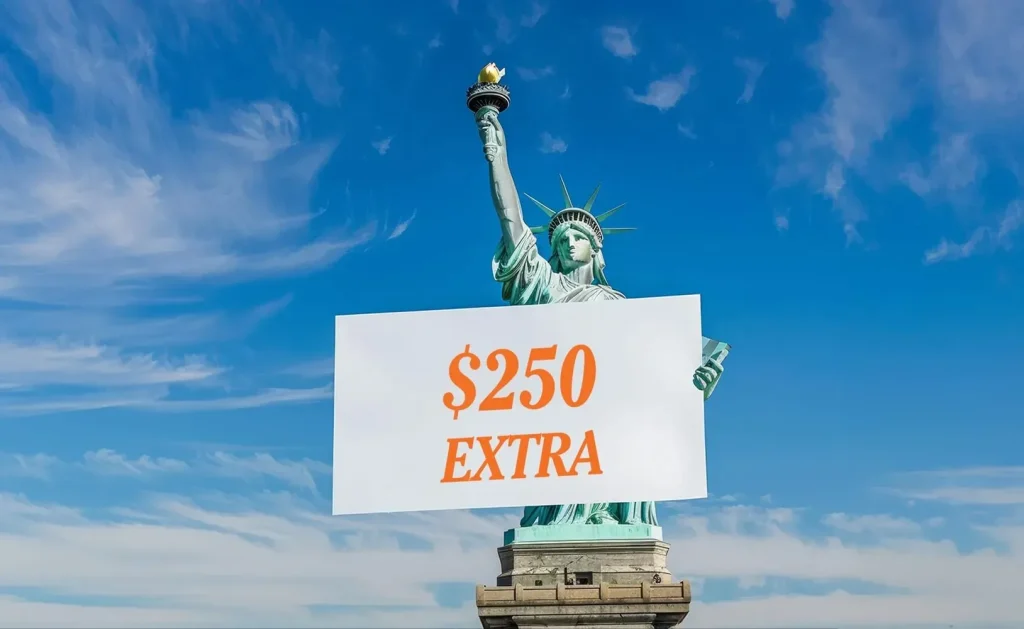The recently introduced Visa Integrity Fee marks a significant shift in the landscape of US travel expenses, adding a minimum charge of $250 for visitors requiring non-immigrant visas. This fee is separate from existing visa application costs, escalating the total financial burden on travelers. As the travel industry looks ahead, the implications of this additional US travel fee raise questions about its impact on tourism and the broader economy. Furthermore, while the visa reimbursement process is still somewhat ambiguous, it may offer a glimmer of hope for those eligible to reclaim part of their visa fees. The introduction of the Visa Integrity Fee undoubtedly sets a precedent, paving the way for increased scrutiny and regulation of travel financials in the United States.
The new charge known as the Visa Integrity Fee, part of evolving travel regulations, is set to affect all individuals seeking entry to the US on non-immigrant visas. This fee, a potential hurdle for tourists, business visitors, and students alike, reflects ongoing changes in the immigration landscape that could influence international travel patterns. Terminology surrounding these travel-related charges, such as ‘non-immigrant visa fee’ or ‘visa application costs,’ illustrates the complex financial dimensions travelers must navigate. Moreover, the visa reimbursement process may offer a solution for eligible applicants, presenting some relief amidst rising travel expenses to the USA. As these new requirements unfold, understanding their implications is crucial for prospective visitors planning their journeys.
Understanding the Visa Integrity Fee: An Overview
The Visa Integrity Fee is a recent addition to the array of expenses travelers must consider when planning their visit to the United States. Set at a minimum of $250, this fee is applicable to all applicants for non-immigrant visas. As reported under the provisions of the One Big Beautiful Bill Act, this fee aims to bolster the integrity of the visa application process while also potentially covering administrative costs associated with processing these visas. This fee is non-waivable, meaning that it must be paid regardless of the outcome of the visa application.
In addition to the Visa Integrity Fee, travelers should also factor in the existing visa application costs. For example, someone applying for a work visa like the H-1B will see the cost increase from $205 to $455 once this new regulation takes effect. Thus, prospective visitors will need to budget not only for travel expenses to USA but also for these added visa fees to avoid surprises during their application process.
How to Prepare for the New Fee Structure
In light of the Visa Integrity Fee, it is essential for travelers to prepare adequately to meet the upcoming financial requirements. Awareness of the new cost structure will enable individuals to allocate their budget more effectively. Reviewing the various visa application costs and the stipulations regarding the reimbursement process is vital. For instance, those planning to apply for non-immigrant visas should immediately seek to understand how this fee integrates into the overall travel expenses to USA.
Moreover, travelers should begin collecting necessary documentation and confirming eligibility according to their visa category well in advance of their application. Depending on individual circumstances, understanding any potential for fee reimbursement can help mitigate costs further. If travelers ensure they maintain compliance with visa terms, such as refraining from unauthorized employment, they may qualify for refunds that can offset the expenses incurred.
Reimbursement Process for the Visa Integrity Fee
The reimbursement process for the Visa Integrity Fee is an essential aspect for visa holders to understand. To be eligible for reimbursement, applicants must adhere strictly to their visa conditions, which include not working illegally and not overstaying their permitted time in the U.S. by more than five days. This regulation is critical for travelers to grasp, as it directly affects their financial outlay and the potential to recuperate some of the fees paid.
Additionally, while specifics about the reimbursement timeline are not yet confirmed, the indication is that refunds will only be issued after the visa has expired, which could create delays. Understanding the reimbursement policy is crucial for travelers budgeting their trip, as this can inform them about how they might recoup some of their visa-related expenses. Moreover, potential travelers should stay informed as clearer guidelines from the Department of Homeland Security (DHS) are released.
The Impact of Visa Fees on Travel Decisions
As the implementation of the Visa Integrity Fee looms, prospective visitors to the U.S. may find themselves reassessing their travel plans due to increased costs. The financial burden of new travel fees, compounded with existing visa application costs, could deter some individuals from applying for a visa altogether. This situation raises questions about the broader implications of such fees on tourism and business visits to the United States, particularly amidst concerns from industry stakeholders.
In response to these growing concerns, organizations like the U.S. Travel Association have highlighted the potential adverse effects of increased visa costs on travel patterns. As international travel rebounds post-pandemic, having a transparent and manageable fee structure will be crucial in encouraging visitors to consider the United States as a viable travel destination. Evaluating how these new fees align with traveler expectations will be essential for maintaining a vibrant tourism economy in the years leading up to significant events such as the America 250 anniversary.
Navigating the Visa Application Process Amid Fee Changes
With the introduction of the Visa Integrity Fee, applicants must now navigate an increasingly complex visa application process. Understanding which fees are applicable, including the integration of the new visa integrity charge into the existing framework, becomes essential for applicants to effectively manage their travel expenses. Since the fee is payable at the time of visa issuance, applicants should prepare financially by ensuring they can cover this additional expense along with other non-immigrant visa fees.
Moreover, applicants should be diligent in informing themselves about the potential impacts of these changes on their travel timelines and expenses. For instance, visa holders need to be aware of their visa’s terms to avoid jeopardizing any possibilities for fee reimbursement. Those applying for business, tourist, or study visas will benefit from gathering information early and seeking guidance from immigration experts to clarify the updated process and plan appropriately for all associated costs.
Upcoming Changes in Fee Structures for Non-Immigrant Visas
As travelers prepare for upcoming changes in fee structures for non-immigrant visas, it is critical to stay updated on the latest guidelines from the Department of Homeland Security. The anticipated increase in travel fees, particularly the Visa Integrity Fee, represents a significant shift in how costs are structured for U.S. visa applicants. Understanding these changes allows travelers to make informed decisions and budget accordingly.
The introduction of the Visa Integrity Fee and adjustments to other visa-related costs highlight a need for travelers to review the total financial commitments associated with their planned trips. Keeping abreast of any further announcements regarding increases or changes in fee structures will allow prospective visitors to mitigate financial impacts as they prepare for travel to the USA.
The Importance of Staying Informed About Visa Changes
With the immigration landscape continually evolving, staying informed about visa changes, including the new Visa Integrity Fee, is vital for anyone considering travel to the United States. Changes in fee structures and application processes can occur at any time, which means prospective travelers must actively seek updates to avoid any last-minute surprises. This vigilance can help ensure that travelers have all necessary information to proceed smoothly with their visa applications.
Moreover, various resources, including official government websites and immigration news platforms, can provide timely updates on visa fees and policies. By staying engaged with these sources, applicants can also gain insights into potential reimbursement avenues and appeal processes, ensuring they are well-equipped to handle the complexities of the visa application experience.
The Role of the U.S. Travel Association in Visa Fee Discussions
The U.S. Travel Association plays a pivotal role in advocating for the interests of travelers, particularly in discussions surrounding increased visa fees such as the emerging Visa Integrity Fee. As the voice of the travel industry, the association highlights the importance of maintaining a balanced and fair visa system that accommodates both security concerns and tourism growth. Their efforts aim to ensure that new regulations do not deter international visitors from choosing the U.S. as their travel destination.
As the implementation of the new fee structures unfolds, the U.S. Travel Association continues to address the impact of increased visa application costs on both business and leisure travel. Their ongoing discussions with policymakers seek to find any options for potential reforms that can ease the financial burden on travelers while preserving essential security measures. The role of such organizations in shaping visa policies will ultimately influence the United States’ attractiveness as a global travel destination.
Future Implications of the Visa Integrity Fee on Travel
As the Visa Integrity Fee is set to become a reality for applicants, the long-term implications on travel patterns and tourism in the United States are worth considering. Higher visa fees can lead to shifts in traveler demographics, with fewer individuals willing to incur the expenses associated with non-immigrant visas. Such changes could significantly impact various sectors within the economy that rely on international visitors for growth.
In preparation for future implications, it becomes vital for travel analysts and industry advocates to monitor trends that emerge post-implementation of the Visa Integrity Fee. Observing how these changes affect trips to the USA and international attitudes towards U.S. travel will provide insights that could inform future policy decisions as stakeholders seek to balance immigration reform with economic vitality.
Frequently Asked Questions
What is the Visa Integrity Fee and when will it be implemented?
The Visa Integrity Fee is a new charge of at least $250 that all visitors requiring non-immigrant visas will need to pay as part of the One Big Beautiful Bill Act. Implementation details are still unclear, with no definitive start date announced.
Who is required to pay the Visa Integrity Fee?
All visitors needing non-immigrant visas, including tourists, business travelers, and international students must pay the Visa Integrity Fee. It is a mandatory cost in addition to current visa fees.
How much will the Visa Integrity Fee be?
For the fiscal year 2025, the Visa Integrity Fee will be a minimum of $250. This fee may increase in the future due to inflation adjustments and is in addition to other existing visa application costs.
Does the Visa Integrity Fee replace other visa application fees?
No, the Visa Integrity Fee is an additional charge. Current visa fees, like the $205 application fee for H-1B workers, will remain. Thus, the total cost for some visa applications could rise significantly.
What is the reimbursement process for the Visa Integrity Fee?
To qualify for reimbursement of the Visa Integrity Fee, visa holders must adhere to the terms of their visa, such as not exceeding the allowed stay. Refunds will be processed after the visa has expired.
What happens if my visa application is denied regarding the Visa Integrity Fee?
If your visa application is denied, you will not have to pay the Visa Integrity Fee, ensuring that travelers are only charged if their visas are successfully issued.
How will the Visa Integrity Fee affect travel expenses to the USA?
The implementation of the Visa Integrity Fee may increase overall travel expenses to the USA, leading to potential concerns from travelers and organizations regarding its financial impact on tourism.
What are the anticipated effects of the Visa Integrity Fee on potential visitors?
While aimed at immigration reform, the Visa Integrity Fee may deter prospective visitors due to increased visa application costs, highlighted by concerns from the U.S. Travel Association, especially leading up to major events like ‘America 250’ in 2026.
How will the U.S. government collect the Visa Integrity Fee?
The method for collecting the Visa Integrity Fee has not yet been determined, as the Department of Homeland Security is still developing a comprehensive strategy involving multiple agencies.
| Key Point | Details |
|---|---|
| Visa Integrity Fee Requirement | Visitors to the U.S. must pay a visa integrity fee as part of new legislation. |
| Amount of Fee | The fee is set at a minimum of $250 and is subject to future hikes and inflation adjustments. |
| Eligibility | All non-immigrant visa applicants, including tourists, business travelers, and students, must pay this fee. |
| Payment Timing | Payment is made upon visa issuance. Deny applicants won’t need to pay the fee. |
| Relation to Other Fees | The integrity fee is additional to current visa fees like the H-1B application fee. |
| Reimbursement Eligibility | Visa holders must adhere to visa terms to qualify for refunds after expiration. |
| Implementation Uncertainties | Details about the start date and the collection method remain unclear, with implementation taking years. |
Summary
The Visa Integrity Fee represents a significant new charge for travelers seeking entry into the United States. Set to be at least $250, this fee will be non-waivable and is intended to support the immigration process outlined in recent legislation. It is crucial for potential visitors to stay informed about the fee’s implementation timeline, reimbursement guidelines, and how it interacts with existing visa costs. As the travel landscape evolves, understanding the financial implications of the Visa Integrity Fee will be essential for planning successful visits.



